23 Jul 2019 | Events
[vc_row][vc_column][vc_single_image image=”108169″ img_size=”full”][vc_column_text]Above: Tehran: City of Love © Here and There Productions[/vc_column_text][vc_column_text]This public symposium will reflect on the paradox of creative constraints in contemporary cinema from the Middle East – a day of film screenings and panel discussions with filmmakers, funders and programmers, including some of the most innovative rising talents as well as established experts.
Freedom of expression is often understood solely through the lens of state censorship. This symposium, however, starts from the premise that social, economic and other constraints shape any film from the outset, rather than only coming at the end of the process in the form of intervention by the state or other parties. It seeks to explore the different kinds of limitations on freedom of cinematic expression, from funding through to problems on set, lack of local distribution and travel restrictions, as well as the complex negotiation between constraints and political and creative impulses behind the films. It will deal with questions such as what types of constraints do filmmakers face when they make and distribute films in the region? To what extent are these constraints either productive or harmful? How do the creative strategies used by filmmakers evolve in response to the constraints?
The symposium will offer new insights into filmmaking from the region, revitalising debates on cinematic creativity in sites of conflict and crisis in the Middle East and beyond.
Confirmed speakers include:
Mounia Akl, Film Director, Submarine (Lebanon, US, 2016)
Naziha Arebi, Film Director, Freedom Fields (UK, Libya, 2018)
Shirin Barghnavard, Film Director, Profession: Documentarist (Iran, 2014)
Fay Breeman, Manager, Hubert Bals Fund of the International Film Festival Rotterdam
Tamer El Said, Film Director and Co-Founder, Cimatheque, Cairo
Julia Farrington, Associate Arts Producer, Index on Censorship
Yael Friedman, Documentary Filmmaker and film scholar
Malu Halasa, Writer and Editor
Ali Jaberansari, Film Director, Tehran: City of Love (Iran, UK, Netherlands, 2018)
Basil Khalil, Film Director, Ave Maria (Palestine, France, Germany, 2015)
Rima Mismar, Executive Director, Arab Fund for Arts and Culture
Persheng Sadegh-Vaziri, Documentary Filmmaker and Film Scholar
Naghmeh Samini, Screenwriter
Elhum Shakerifar, BAFTA-nominated film producer, MENA programme advisor for the BFI London Film Festival and Film Curator for Shubbak, festival of contemporary Arab culture
Full schedule available here.[/vc_column_text][vc_column_text]
When: Saturday 7 September 2019 10:00 am
Where: The Mosaic Rooms, Tower House, 226 Cromwell Road, London SW5 0SW
Tickets: £5.00 – £6.50 via Mosaic Rooms (includes lunch/refreshments)
[/vc_column_text][vc_column_text]
The paradox of creative constraints resource pack
Symposium organiser Shohini Chaudhuri has put together a reading list of articles dealing with constraints in Middle Eastern cinema from the Index on Censorship magazine archive.
- An undelivered love letter: Kite Runner star Khalid Abdalla talks about how his film In the Last Days of the City can’t be screened in the city where it is set, Cairo
- Make art not war: Yemeni artists are painting the streets of bombed out cities with their protests
- Return of Iraq’s silver screen: Iraq’s film industry is reviving after decades of conflict. Can it help the nation rebuild?
- Mission Unaccomplished
- New Times, Same Problems
[/vc_column_text][/vc_column][/vc_row][vc_row][vc_column][vc_column_text]Presented in partnership with:[/vc_column_text][vc_row_inner][vc_column_inner width=”1/3″][vc_single_image image=”108172″ img_size=”full” onclick=”custom_link” link=”https://mosaicrooms.org/”][/vc_column_inner][vc_column_inner width=”1/3″][/vc_column_inner][vc_column_inner width=”1/3″][/vc_column_inner][/vc_row_inner][/vc_column][/vc_row]
29 Apr 2019 | Artistic Freedom, Campaigns -- Featured, Fellowship 2016, Statements, Yemen
[vc_row][vc_column][vc_single_image image=”74843″ img_size=”full” add_caption=”yes” alignment=”center”][vc_column_text]Murad Subay, a Yemeni street artist and the 2016 Index on Censorship Freedom of Expression Awards Arts Fellow, was rejected for a visa to study at Aix-Marseille University as part of a one-year grant for threatened artists.
Subay, who creates murals protesting against Yemen’s civil war, was given a grant to study under the Institute of International Education’s Artistic Protection Fund, sponsored by the Andrew W. Mellon Foundation, which makes fellowship grants to artists from any field of practice, and places them at host institutions in safe countries where they can continue their work and plan for their futures.
The visa that would have allowed Subay to study was rejected by authorities on Friday, he told Index via email.
“This rejection highlights a spreading hostility to artistic freedom around the world. From Uganda to Indonesia to Cuba, proposed legislation threatens to control artists, while a growing number of supposedly democratic countries such as the UK frequently refuse visas to foreign authors, musicians and activists for events or training. This reinforces notion that constraining artistic freedom is acceptable,” Jodie Ginsberg, CEO of Index on Censorship said.
“We ask French authorities to reverse this decision and allow Murad, an Index fellow, to study.”
Subay’s murals grew from the frustration he felt as his homeland descended into chaos and factionalism. Amid the destruction and anger, Subay picked up his brush. He went out into the streets with friends and began painting in broad daylight. After a few days he was joined by people from the community driven by their desire for peace amid Yemen’s civil war.
The Yemeni civil war has been raging since 2015. An estimated 13,600 people have been killed, including more than 5,200 civilians. The strife has contributed to the death of an estimated 50,000 people from an ongoing famine. In 2018, the United Nations warned that 13 million Yemeni civilians face starvation in what it says could become “the worst famine in the world in 100 years.”[/vc_column_text][vc_basic_grid post_type=”post” max_items=”4″ element_width=”6″ grid_id=”vc_gid:1556538997921-272e591f-f0ed-0″ taxonomies=”8196″][/vc_column][/vc_row]
31 Jan 2019 | Bahrain, Bahrain Statements, Campaigns -- Featured, Middle East and North Africa
[vc_row][vc_column][vc_column_text]
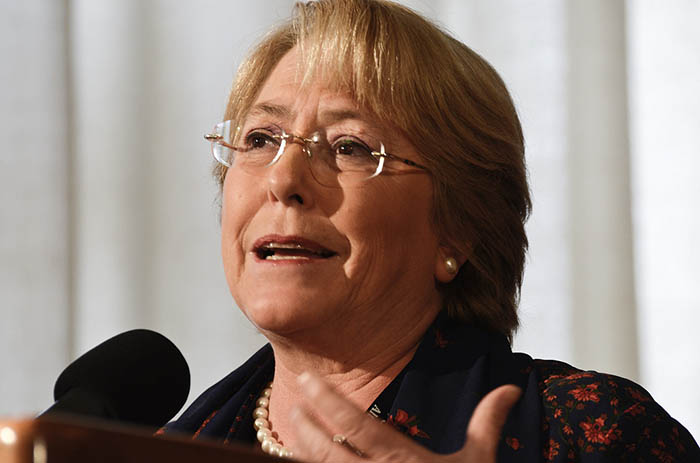
Michelle Bachelet, United Nations High Commissioner for Human Rights. Credit: UN Women / Flickr
H.E. Michelle Bachelet
United Nations High Commissioner for Human Rights
Office of the High Commissioner for Human Rights (OHCHR)
United Nations
52 Rue des Paquis
1201 Geneva, Switzerland
Your Excellency,
We, the undersigned organisations, write to you to express our concern regarding the worsening situation for civil society in Bahrain. We believe co-ordinated international action coupled with public scrutiny are imperative to address the government of Bahrain’s ongoing attacks on civil society and to hold the kingdom accountable to its commitments to international human rights laws and standards. To this end, we call upon your Office to continue to monitor the situation in Bahrain and to continue to raise concerns at the highest level, both publicly and privately, with the government, as was done by your predecessor, Zeid Ra’ad Al Hussein. We believe heightened scrutiny of Bahrain’s human rights record and its ongoing human rights violations is particularly important now that the kingdom is a Member State of the Human Rights Council.
In the past two years, the Bahraini government increased its repression of the kingdom’s remaining civil society organisations, political opposition groups, and human rights defenders. In June 2016, Bahrain’s Administrative Court forcibly dissolved al-Wefaq, Bahrain’s largest political opposition society, a ruling that was upheld in February 2018. In May 2017, a court approved the forcible dissolution of the National Democratic Action Society, also known as Wa’ad. Only a month later, the government indefinitely suspended the kingdom’s last remaining independent newspaper, Al-Wasat, continuing its repression of free expression and press freedom.
While there were hopes that the government might ease repression in the run-up to elections for the lower house of parliament on 24 November 2018, these were dashed with a series of actions and policies that effectively precluded the elections from being free or fair, and that continued the broader assault on civil society. Only weeks ahead of ahead of the elections, the country’s highest appeals court sentenced Sheikh Ali Salman, the Secretary-General of Al-Wefaq, to life in prison on spurious charges of espionage dating from 2011. The government also enacted new legislation banning all individuals who had ever belonged to a dissolved political society from seeking or holding elected office, as well as anyone who has ever served six months or more in prison. This affects a large portion of Bahrain’s population, as the kingdom currently has around 4,000 political prisoners.
Beyond rigging the election process at the expense of political opposition societies and free and fair participation, over this past year Bahrain has continued to target, harass, and imprison activists and human rights defenders for exercising their right to free expression. The government criminalised calls to boycott the elections, and, on 13 November 2018, arrested former Member of Parliament Ali Rasheed al-Asheeri for tweeting about boycotting the November elections. On 31 December 2018, Bahrain’s Court of Cassation – its court of last resort – upheld prominent human rights defender Nabeel Rajab’s five-year prison sentence on spurious charges of tweeting and re-tweeting criticism of torture in Jau Prison and the war in Yemen, drawing criticism from the Office of the High Commissioner for Human Rights. With this decision, Rajab has exhausted all legal remedies to reverse the charges and will remain in prison until 2023. He has already served a two-year prison sentence on charges related to television interviews in which he discussed the human rights situation in the kingdom.
While Bahrain has several institutions tasked with oversight responsibilities and enforcing accountability for human rights abuses, we have grave concerns over their effectiveness, their independence, and their commitment to fulfilling their mandates. Similar concerns have been raised about other Bahraini institutions – the National Institution for Human Rights (NIHR) and the Ministry of Interior Ombudsman – by the UN Human Rights Committee. In the Committee’s first evaluation of Bahrain under the International Covenant on Civil and Political Rights (ICCPR) in July 2018, it found the NIHR largely lacked sufficient independence from the government. The European Parliament has also criticised the NIHR, including in a June 2018 resolution where the body expressed “regret” for the honours it has bestowed upon the NIHR. In the resolution, the European Parliament cited the institution’s lack of independence to fulfil its duties. The Ministry of Interior (MoI) Ombudsman has received sharp criticism, including from the UN Committee Against Torture (CAT). The CAT cited the Ombudsman’s lack of independence, impartiality, and efficacy in addressing complaints submitted to the institution.
Bahrain’s national institutions not only fail to implement human rights reforms, they help perpetuate and whitewash abuses. Both the Ombudsman and NIHR have released reports that sanitise violations like police brutality, while neglecting to address or condemn violent police raids on peaceful protests.
The failure of Bahrain’s human rights institutions to address serious abuses both reflects and promotes a broader culture of impunity in the country, where the government can continue to suppress free expression and civil society.
Despite these abuses and despite concerns from UN bodies, Bahrain has not been the subject of collective action in the United Nations Human Rights Council (HRC) since a joint statement in September 2015 at HRC 30. Since then, the government has taken increased steps to limit fundamental freedoms, including restricting the rights to free expression, free assembly, free association, and free press, dissolving political opposition societies and jailing human rights defenders, religious leaders, and political figures. However, even as Bahrain has embarked on this campaign to suppress opposition and dissent, state action on Bahrain in the HRC has been limited to individual condemnations by various governments under Agenda Items 2 and 4.
Despite this lack of joint action, the Office of the High Commissioner has been consistently vocal about Bahrain’s rights abuses, and we are very appreciative of the Office’s attention over the past several years. Your predecessor raised concerns about Bahrain in his opening statements at the HRC, including at the 36th Council session, where he highlighted restrictions on civil society and the kingdom’s lack of engagement with international human rights mechanisms, and at 38th Council session, in which he reiterated past concerns and sharply criticised Bahrain for its continued refusal to co-operate with the Office of the High Commissioner and the mandates of the Special Procedures.
We believe that this UN scrutiny is now even more necessary as Bahrain assumes a seat on the Council as a Member State.
We strongly urge you to continue to monitor the situation, to publicly express your concerns to Bahraini officials, and to call on the Bahraini government to meet its international obligations, including those concerning protecting and promoting civil society. Without an independent, viable civil society in the country there can be no serious domestic pressure on the government to relax restrictions and ease repression.
We call on you to highlight Bahrain’s restrictions on civil society, targeting of human rights defenders, dissolution of political opposition, and unrelenting attacks on free expression in your opening statement at the 40th Human Rights Council session, the first session of which Bahrain is a member of the Council.
Sincerely,
Americans for Democracy & Human Rights in Bahrain (ADHRB)
Adil Soz – International Foundation for Protection of Freedom of Speech
ARTICLE 19
Bahrain Center for Human Rights
Cairo Institute for Human Rights Studies (CIHRS)
Cartoonists Rights Network International (CRNI)
Center for Media Studies & Peace Building (CEMESP)
Centre for Independent Journalism (CIJ)
Foro de Periodismo Argentino
Freedom Forum
Independent Journalism Center (IJC)
Index on Censorship
Initiative for Freedom of Expression – Turkey
Maharat Foundation
Mediacentar Sarajevo
Media Foundation for West Africa (MFWA)
Norwegian PEN
OpenMedia
Pacific Islands News Association (PINA)
PEN America
Southeast Asian Press Alliance (SEAPA)
South East Europe Media Organisation
Syrian Center for Media and Freedom of Expression (SCM)
Vigilance for Democracy and the Civic State
Asian Human Rights Commission (AHRC)
Association for Human Rights in Ethiopia (AHRE)
Bahrain Institute for Rights and Democracy
Cairo Institute to Human Rights Studies (CIHRS)
CIVICUS
European Centre for Democracy and Human Rights
Odhikar (Bangladesh)
Center for Civil Liberties (Ukraine)
Sudanese Development Initiative (Sudan)
JOINT Liga de ONGs em Mocambique
West African Human Rights Defenders Network
Latin American Network for Democracy (REDLAD)
Ligue Burundaise des Droits de l’homme ITEKA
Organisation Tchadienne Anti-Corruption (OTAC)[/vc_column_text][/vc_column][/vc_row][vc_row][vc_column][vc_basic_grid post_type=”post” max_items=”4″ element_width=”6″ grid_id=”vc_gid:1549278314945-d1d5bcda-455e-2″ taxonomies=”716″][/vc_column][/vc_row]
3 Jan 2019 | Artistic Freedom, Index Arts, Magazine, News and features, Student Reading Lists, Volume 47.04 Winter 2018 Extras
[vc_row][vc_column][vc_column_text]
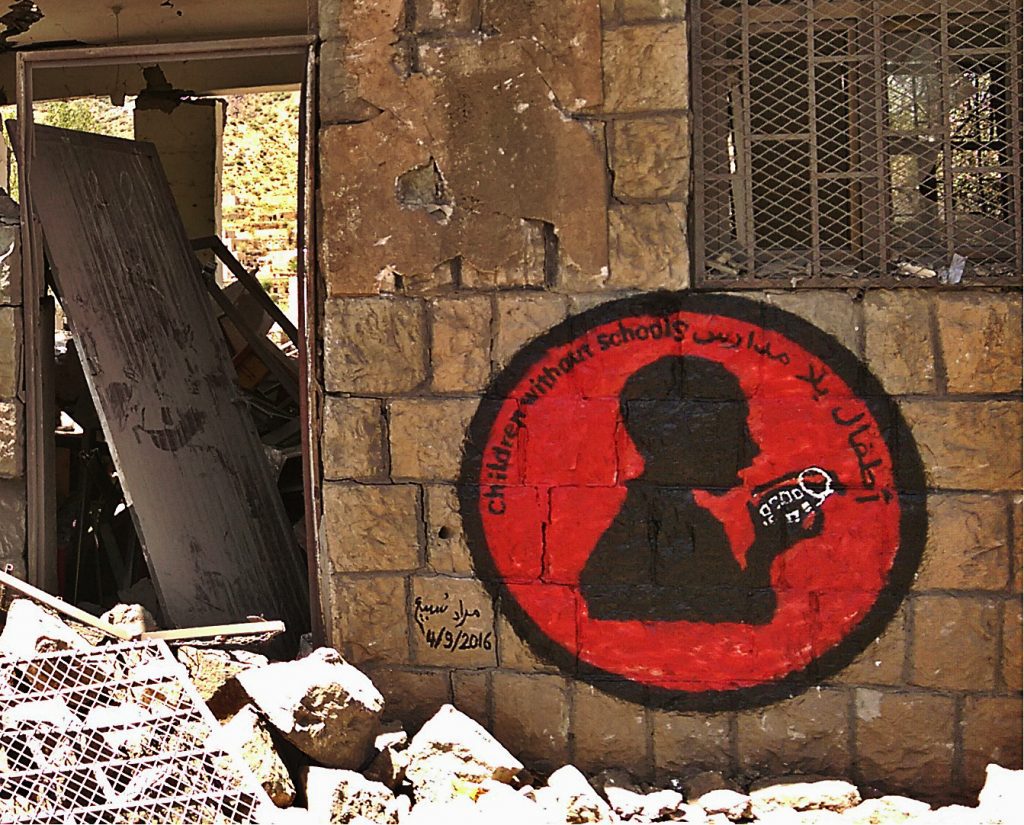
An anti-war mural created by Yemeni street artist Murad Subay, 2016 Freedom of Expression Arts Award winner.
Art has been used as a form of protest during times of crisis throughout history. It is a popular and, at times, effective platform to express opinions about societal or governmental problems, particularly when other forms of protest are not available. Protest art includes performances, site-specific installations, graffiti and street art.
Here Index highlights key articles about art and protest from around the world, from the past five decades.
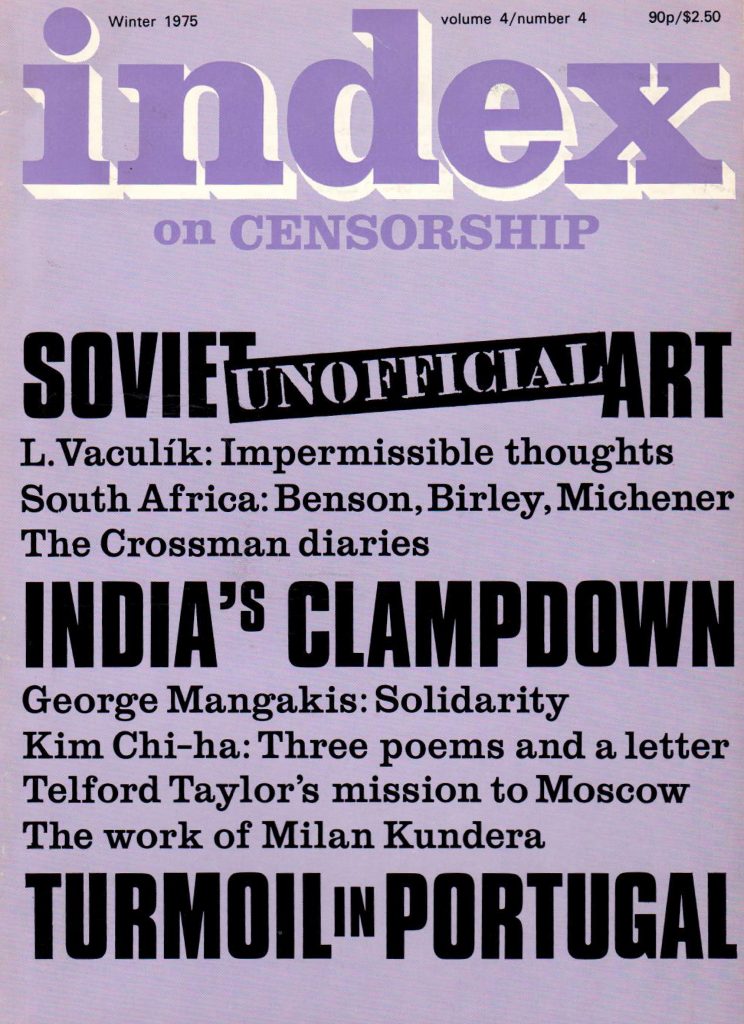
Soviet “unofficial” art
December 1975, vol. 4 issue: 4
Alexander Glezer writes about his participation in organising the unofficial art exhibit in Moscow. When the first exhibition opened, it was bulldozed by undercover police officers and agents from the KGB (Committee for State Security). In the second exhibition, the authorities were forced by the public to grant permission and ten to fifteen thousand people came to see the paintings and sculptures of 50 nonconformist artists’. Glezer, 41-years-old, was questioned by the KGB, arrested and sentenced 10 days for “hooliganism”. He was allowed to leave the Soviet Union in 1975 February.
Read the full article
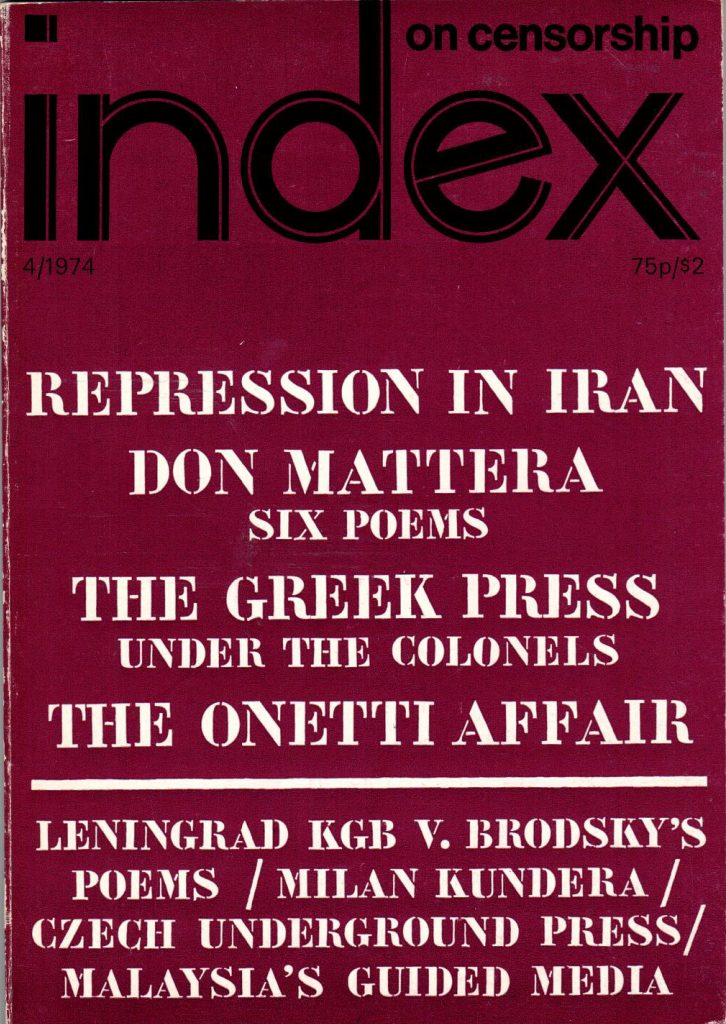
Portugal: Art triumphant
December 1974, vol. 3 issue: 4
The Sao Mamed Gallery opened with 186 artworks by 87 artists who had never shown their work in public before due to the regime’s dictating of Portuguese life. The gallery was built to celebrate the result of the military coup abolishing censorship of expression.
Published in the New York Times.
Read the full article
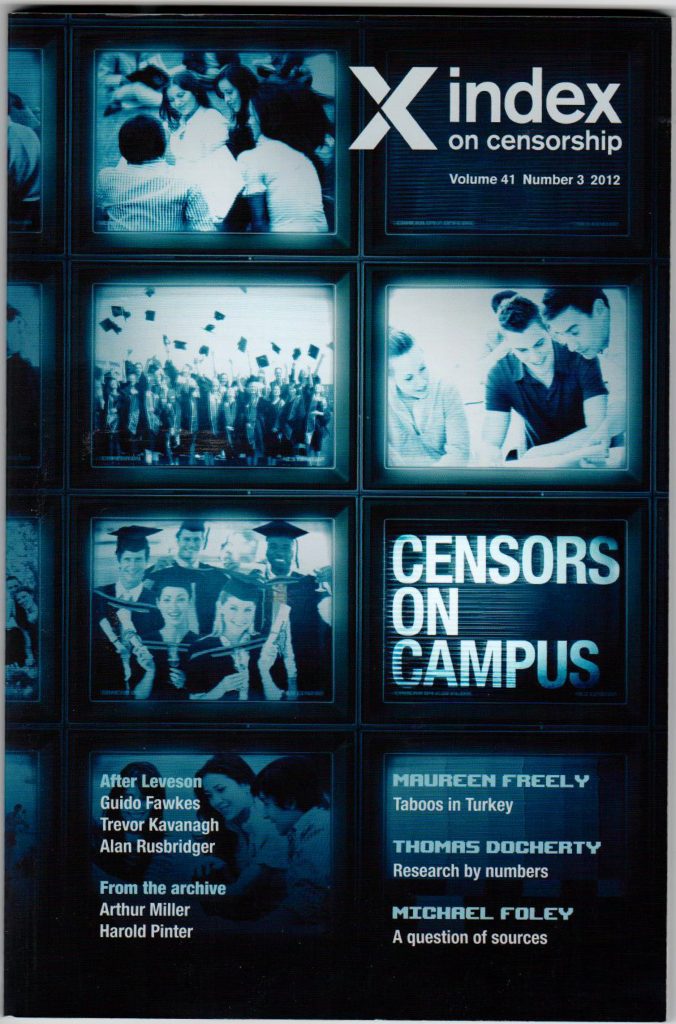
Art of Resistance
September 2012, vol. 41 issue: 3
Malu Halasa, co-curator of the exhibition Culture in Defiance: Continuing Traditions of Satire, Art and the Struggle for Freedom in Syria, writes about how the violence in Syria affected country’s art of resistance production and then created ideas of spreading this work further West which was the reason for the exhibition’s creation.
Read the full article
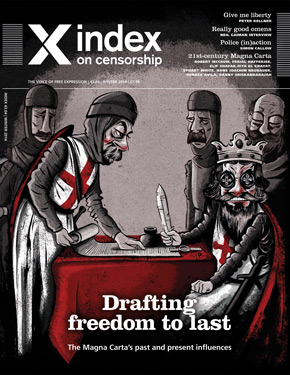
Dark Arts: Three Uzbek artists speak out on state constraints
December 2014, vol. 43 issue: 4
Author Nargis Tashpulatova interviews writer three Uzbek artists – Sid Yanishev, photographer Umida Akhmedova and conceptual artist Vyacheslav Akhunov who continue to create artwork throughout governmental threats and censorship and the regression of art in Uzbek society.
Read the full article
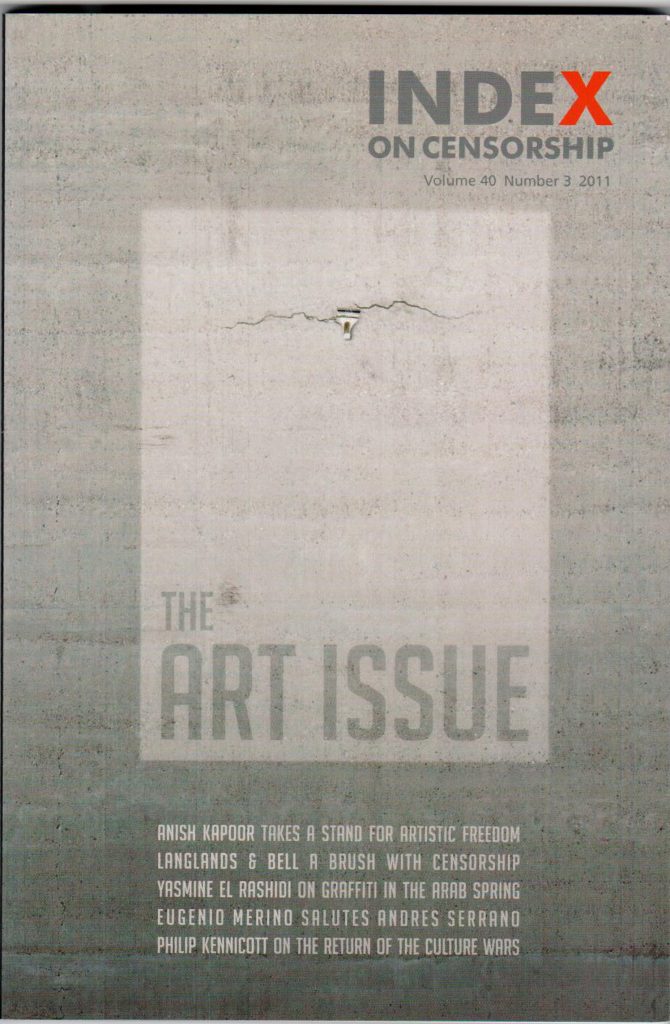
Art or Vandalism
October 2011, vol. 40 issue: 3
Yasmine El Rashidi writes on the outbreak of graffiti in the streets in Cairo during the 18 days of the Egyptian revolution.
Read the full article
[/vc_column_text][/vc_column][/vc_row][vc_row][vc_column][vc_basic_grid post_type=”post” max_items=”4″ element_width=”6″ grid_id=”vc_gid:1546513460633-7f241be5-ccf1-1″ taxonomies=”8890″][/vc_column][/vc_row]







